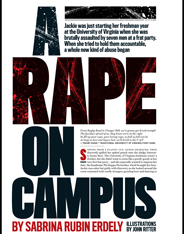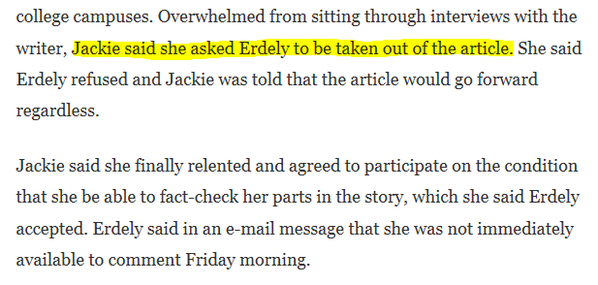Jackie said ‘no’ to Rolling Stone: how the magazine passed the University of Virginia rape story
 So. How did Jackie’s story of being a victim of gang rage at a University of Virginia fraternity ever make it into Rolling Stone? She didn’t want it in print. But the story fitted an agenda.
So. How did Jackie’s story of being a victim of gang rage at a University of Virginia fraternity ever make it into Rolling Stone? She didn’t want it in print. But the story fitted an agenda.
It was published.
Rather than being a shining beacon of truth and light in a pit of hidden depravity on campus, the horror has become like those 1980s stories of ritualised Satanic Abuse and other tales that instil fear and panic in the reader.
Rolling Stone’s veteran Matt Taibbi’s is aghast. He tweets:
* A few words about this UVA business, since people are asking…
* First, like everyone else at the magazine, I’m both mortified and sorry — for the public, for anyone affected, and for the source herself.
* Managing Editor Will Dana is a mentor and friend who has always had my back and is one of the few true good people in this business.* I’m broken up for him.
* People also need to understand that the mistake here did not involve the fact-checking department.
* I was so surprised because Coco McPherson’s fact-checking operation is so intense that it’s nearly caused me nervous breakdowns in the past
* It usually takes longer to fact-check a Rolling Stone feature than it does to write it. Each review is like an IRS audit. It’s miserable.
* At RS, they don’t accept notes as backup. You must have everything on tape or video, or sources must speak directly with fact-checkers
* I’m just explaining to people what my experience with this magazine has been. I’m sure other RS contributors will say exactly the same.
Will Dana has apologised for Sabrina Rubin Erdely’s story:
Last month, Rolling Stone published a story entitled A Rape on Campus which described a brutal gang rape of a woman named Jackie during a party at a University of Virginia fraternity house, the University’s failure to respond to this alleged assault – and the school’s troubling history of indifference to many other instances of alleged sexual assaults. The story generated worldwide headlines and much soul-searching at UVA. University president Teresa Sullivan promised a full investigation and also to examine the way the school investigates sexual assault allegations.
Because of the sensitive nature of Jackie’s story, we decided to honor her request not to contact the man who she claimed orchestrated the attack on her nor any of the men who she claimed participated in the attack for fear of retaliation against her. In the months Erdely reported the story, Jackie said or did nothing that made her, or Rolling Stone’s editors and fact-checkers, question her credibility. Jackie’s friends and rape activists on campus strongly supported her account. She had spoken of the assault in campus forums. We reached out to both the local branch and the national leadership of Phi Psi, the fraternity where Jackie said she was attacked. They responded that they couldn’t confirm or deny her story but that they had questions about the evidence.
In the face of new information reported by the Washington Post and other news outlets, there now appear to be discrepancies in Jackie’s account. The fraternity has issued a formal statement denying the assault and asserting that there was no “date function or formal event” on the night in question. Jackie herself is now unsure if the man she says lured her into the room where the rape occurred, identified in the story, as “Drew,” was a Phi Psi brother. According to the Washington Post, “Drew” actually belongs to a different fraternity and when contacted by the paper, he denied knowing Jackie. Jackie told Rolling Stone that after she was assaulted, she ran into “Drew” at a UVA pool where they both worked as lifeguards. In its statement, the Phi Psi says none of its members worked at the pool in the fall of 2012. A friend of Jackie’s (who we were told would not speak to Rolling Stone) told the Washington Post that he found Jackie that night a mile from the school’s fraternities. She did not appear to be “physically injured at the time” but was shaken. She told him that that she had been forced to have oral sex with a group of men at a fraternity party, but he does not remember her identifying a specific house. Other friends of Jackie’s told the Washington Post that they now have doubts about her narrative, but Jackie told the Washington Post that she firmly stands by the account she gave to Erdely.
We published the article with the firm belief that it was accurate. Given all of these reports, however, we have come to the conclusion that we were mistaken in honoring Jackie’s request to not contact the alleged assaulters to get their account. In trying to be sensitive to the unfair shame and humiliation many women feel after a sexual assault, we made a judgment – the kind of judgment reporters and editors make every day. We should have not made this agreement with Jackie and we should have worked harder to convince her that the truth would have been better served by getting the other side of the story. These mistakes are on Rolling Stone, not on Jackie. We apologize to anyone who was affected by the story and we will continue to investigate the events of that evening.
Will Dana
Managing Editor
That’s a fair and frank apology.
Shots In The Dark says fairness came eventually:
Rolling Stone strikes the wrong note by putting out a statement saying that “we have come to the conclusion that our trust in [Jackie] was misplaced.”
Jackie, who may genuinely not know whatever happened to her, did not force Rolling Stone to publish anything. She did not force Rolling Stone to abandon basic tenets of journalism. It’s pretty simple: The magazine wanted to run with a bombshell story and chose to compromise its standards in order to do so.
To be fair, managing editor Will Dana acknowledges Rolling Stone’s responsibility in subsequent tweets and interviews.
But it’s gross that Rolling Stone’s first instinct was to throw Jackie under the bus. Meanwhile, the author of the piece has not said a word taking responsibility. That’s not right.
And Jackie:

When the one source to your single thread story backs out, you should ask questions.
But, as Paul Farhi writes, things were not good from the outset:
The writer of a blockbuster Rolling Stone magazine story about an alleged gang rape at a University of Virginia fraternity has said that she was unable to contact or interview the men who supposedly perpetrated the crime.
In interviews with The Washington Post and Slate.com last week, writer Sabrina Rubin Erdely declined to answer repeated questions about the men’s response to an allegation by a female student named Jackie that they had sexually assaulted her at a U-Va. fraternity party in 2012.
However, in a podcast interview with Slate, Erdely indicated that she was unable to locate the fraternity brothers in the course of her reporting to get their side of the story.
“I reached out to [the accused] in multiple ways,” Erdely said in the Slate interview. “They were kind of hard to get in touch with because [the fraternity’s] contact page was pretty outdated. But I wound up speaking . . . I wound up getting in touch with their local president, who sent me an e-mail, and then I talked with their sort of, their national guy, who’s kind of their national crisis manager. They were both helpful in their own way, I guess.”
Sean Woods, who edited the Rolling Stone story, said in an interview that Erdely did not talk to the alleged assailants. “We did not talk to them. We could not reach them,” he said in an interview…
Erdely declined to say whether she knows the names of the alleged perpetrators, including “Drew.”
“I can’t answer that,” she said. “This was a topic that made Jackie extremely uncomfortable.”
Did anyone check anything?
Faced with an uproar from students, faculty and alumni, university President Teresa Sullivan quickly suspended all fraternity and sorority activities until early January, saying there needed to be a discussion about “our next steps in preventing sexual assault and sexual violence.” Elected officials expressed concern, too, and rallies and demonstrations roiled the campus…
he reaction surprised, as well as gratified, Erdely, 42, a contributing editor to Rolling Stone and a freelancer who writes frequently about crime and social issues.
“I was concerned, very late in the game, that no one would be willing to read this story,” she said in an interview. “I thought the reaction would be, ‘We know about this problem,’ and they’d turn the page. But this has really sparked a huge discussion. It’s really heartening.”
But not in the way she meant it to be…
Posted: 7th, December 2014 | In: Key Posts 0 Comments | TrackBack | Permalink


